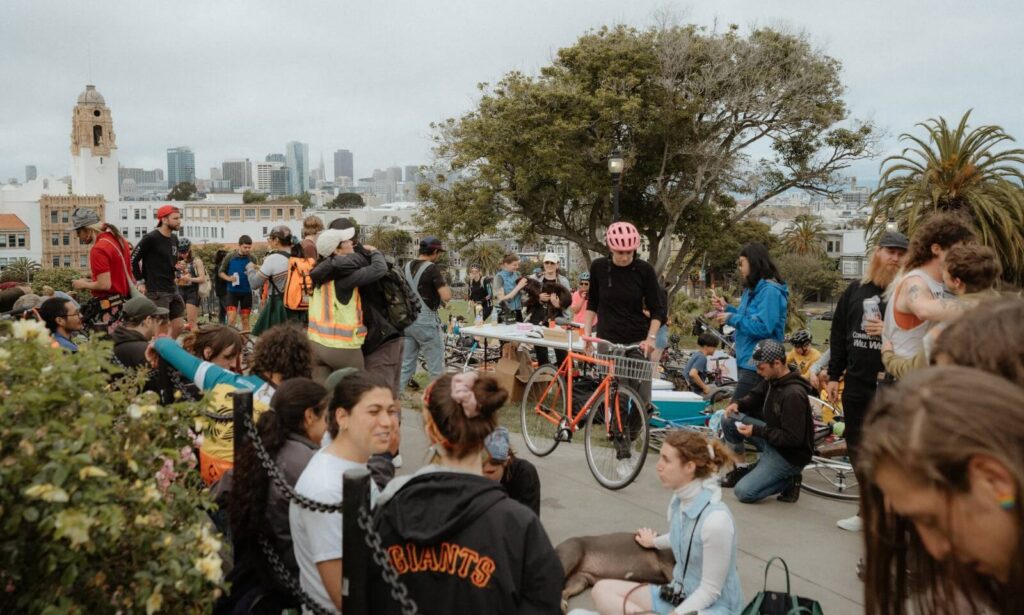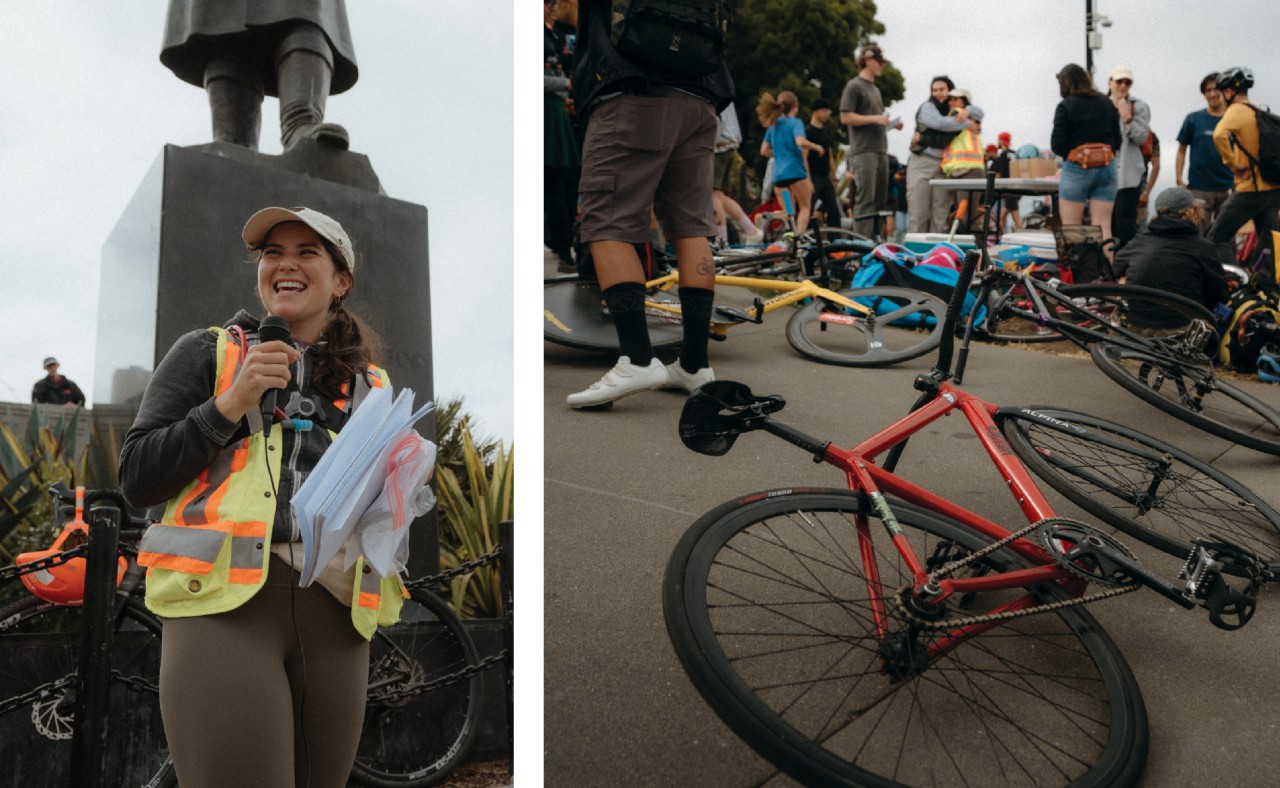Pride Cat: Racing for the Transgender District
By Zachary Morvant
We recently sat down with Alana Mari to talk about the third edition of the Pride Cat, an alleycat race she hosts during Pride month in San Francisco.
Tell us about Pride Cat. What is it?
Pride Cat is a fundraiser alleycat for queer people and allies benefiting the Transgender District in SF. For those who don’t know, an alleycat is a checkpoint race/scavenger hunt on bikes originating from bike messenger culture. Racers don’t know where they have to go until the race starts.
There is also an educational component to Pride Cat: every checkpoint is some kind of queer-related clue. Last year every checkpoint involved facts about transgender women who were pioneers in some way. This year I focused on queer-owned businesses around SF. At the end of the race, during the podium ceremony, they also shared a little bit about what they learned.
 Pride Cat racers gather in Dolores Park. Photo: Richard Hoang / @rhoangphoto.
Pride Cat racers gather in Dolores Park. Photo: Richard Hoang / @rhoangphoto.
What’s Pride Cat’s origin story?
I was at my first alleycat a few years ago and fell in love with them. I love navigating and going fast with other people. Someone suggested I host one for Pride, and even though I was new to the scene, I got a lot of encouragement and support. That made me start thinking I could do this. Then I had the idea of making it a fundraiser for an organization that helps the LGBTQ+ community.
How did you find your beneficiary, the Transgender District?
I’d been aware of their work from following other queer groups. At the time, the Transgender District was seeking historic landmark status for the Tenderloin. I thought it’d be important to support the transgender community specifically because they’re the most at-risk in our community.
Another thing that appealed to me about the Transgender District is it is founded and led entirely by trans women of color. I wanted the organization we benefited to be run by people who are from and understand the needs of their community.
That’s awesome. How much have you raised for them so far?
This year, we raised just over $2,000. Combined with the previous two years, we’ve raised over $5,700 in total. Not bad for a local alleycat race!
What’s your favorite thing about Pride Cat?
I think my favorite thing is that we bring people together from so many different backgrounds. A lot of people come together through bikes, also queerness or being an ally. It’s cool to see so many different people from the bike community mingle: messengers, commuters, professional racers and see them come together for a good cause.
Organizing an event like this is never easy. What’s your biggest challenge?
This year I realized I struggle with delegating. This is not just a one-person job. So I made an effort to recruit volunteers earlier on. Every year I learn something to help make it a little smoother, a little better and I’m looking forward to applying those learnings to next year and work closer with whoever wants to get more involved and take on more of the planning of it with me.

Race organizer Alana Mari announces the winners. Photos: Richard Hoang / @rhoangphoto.
What are your goals for the future of Pride Cat?
I don’t think I have any big goals in terms of scaling it. I’ve been very happy with it. I think keeping it among the people, for the people, is the most important part to me. That said, I’ve played with the idea of a company potentially matching what we raise. That’d be a cool thing to pursue. If you know any that might be interested, please reach out!
What do you think about the UCI’s (Union Cycliste Internationale, bike racing’s global governing body) decision regarding gender categorization?
Highly disappointing but not entirely unexpected. I think that’s a lot of people’s response at the moment. It’s really tough when it seems like they already decided the solutions they want to find, and are now finding the “science” to back up their transphobia.
But some people — especially some trans people I know — their heart is in racing. And this is a huge step back. It goes against the International Olympic Committee’s guidelines for inclusion in sport.
How can race promoters be more inclusive in this regard?
I think language is important. Not naming fields just “men’s” or “women’s” can signal a queer-inclusive environment. But there’s a dance you sometimes have to do; I have personally experienced being barred from using WTFNB (Women, Trans, Femme, Non-Binary) in my promotional materials for USA Cycling races.
I think the underground racing scene has always been more inclusive by nature. Alleycats, events like Mission Crit, tracklocross, even the track has a lot of potential. Anything that doesn’t have to use the UCI or its structures gives us more freedom, and helps us get more people on bikes, which is the real goal in my opinion.
Interested in volunteering for the next Pride Cat? Follow Alana on Instagram @tamagoshawty for updates.
Have you or someone you know been involved in a bicycle crash? Want to know about your rights? Are you a lawyer handling a bicycle crash who wants the best result for your client? Contact Bicycle Law at (866) 835-6529 or info@bicyclelaw.com.
Bicycle Law’s lawyers practice law through Coopers LLP, which has lawyers licensed in California, Oregon, and Washington state, and can affiliate with local counsel on bicycle cases across the country to make sure cyclists benefit from cycling-focused lawyers.
